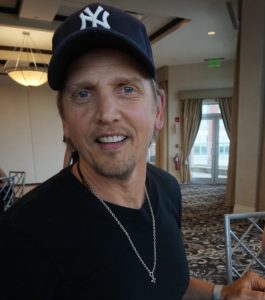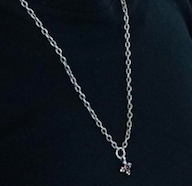
NOIAFT founder, Taylor Taglianetti, had the opportunity to participate in a roundtable interview with Crawl star, Barry Pepper, and a number of other journalists. Here’s what they discussed:
Q: I hear we have a mutual friend, Paul Borghese.
Pepper: We’ve been buddies, fast friends, since 61*. He played Yogi and I played Roger. Lovely guy. His mom cooked me one of the best Italian meals I’ve ever had in my life!
Q: Well, I guess you’re not trying any alligator after doing this movie. Have you tried any, actually?
Pepper: Yeah, I have actually. I went to this café in Vancouver called the Wheezy. They used to do a nice barbecue gator.
Q: Since we’re talking about eating…when the gator eats your arm…I know they must be using some kind of green screen, but how does that feel when you do it and see it, having no arm?
Pepper: I thought it looked stunning to me because you think on the day that it’s, just how is this ever going to work? Your arm is hidden. You’ve got a device that is a tear-away piece and a stunt man pretending to be the gator and it’s all just very difficult trying to escape into it. You really just have to employ your imagination in times like that. For me, knowing how the sausage was made, literally, I was pretty impressed when I saw it because it’s just wow—that is the magic that is Alex Aja.
Q: Was there any touch of acting when you have to play that part..something extra that you have to psych yourself into doing to remember that there is no arm there in the scene?
Pepper: Yeah, the entire scene because you’re being pulled under water and fighting something that isn’t there so that entire stunt sequence was just me so you’re really having to replicate something out of your imagination. That was one of the most amazing parts of filmmaking; it was working with the stunts-effects crew. We thought these guys and gals that are so good at fabricating these prosthetic devices and tear-away pieces and you know—the makeup work and the stuntmen in gator suits or the photorealistic mechanical replica gators…all of that stuff just helps you, as an actor, really immerse yourself because I have no reference for a 15 foot, 1,500 pound alligator. I really just have to rely on their ability to build these puppets and mechanical creatures and then the rest is up to your imagination, but they’re such an instrumental part of your work. They explain to you the weight and the feel and the pull and the bite and the pressure. I think it’s 3,800 pounds per square inch. They say equal to that of a T-rex. I read that, but I’m not sure if that’s true. But they are just such a great source for you as an actor for those two months of filming that you’d be lost, you’d be sunk without them.
Q: What was the most arduous part of the whole process?
Pepper: It was like a ten week fight camp in the swamp. You know, being submerged 12 hours a day you come out like a prune. It’s sort of a physical endurance test. You’re just exhausted and soaking wet and physically drained because of all the high level intensity of the emotions and the stunts. You’re just constantly at a 10 in these types of films. There’s not a lot of levels. You build but where my character begins, he’s severely wounded and has a snapped leg and shredded by having been ripped apart by a gator and thrown or left unconscious. When she finds him, he’s coming to, but the pain all of sudden comes rushing back for him. From that point forward, he’s mending and trying to help his daughter to survive. It becomes a high level of intensity for the whole production and so for pretty much every day for two months you have to always find that level in an authentic way without exhausting yourself to the point where you can’t pick up the next day. But everyday it was exciting because it was innovative and challenging. In that, our sets were massive. We had three or four container warehouses where shipping containers would have been stored in the port of Belgrade, and they’re maybe 80 meters by 100 meters. Football field size shipping warehouses and they built our town sets in those warehouses then flooded them to chest deep water. So they built all the houses, gas stations, and submerged cars, and palm trees. It was just extraordinary. Each day it was really exciting to see the massive wind turbines and rain machine and bent over palm trees and houses with their roofs lifting off and cars floating by and all the gator work. The animal training with the dog…everyday was a new adventure. There were so many unknowns going into it. Like would these warehouses hold all this water? They didn’t have any reference points to call other filmmakers and say how did you submerge a town in a Category 5 hurricane and how did you do the gator attacks. It was innovative in that sense and so that part was the balancing effect for me. In that, that kept me really entertained and interested even though it was punishing.
Q: Is it hard to act in one claustrophobic room?
Pepper: No, in fact, it’s easier. We’d dive into the house each day and dive down into the crawl space and past the tangle furniture, and debris and wires, and past the crew with their dive gear and underwater cameras and then you’d come into this dark little corner of the crawl space and you’d be there for the day and it was easier to stay in that confined space and be in that claustrophobic feeling for that day than to remove yourself and change your clothes, say during lunch; we’d just stay in our wet, skanky costumes all day long. Fortunately, Belgrade had beautiful, hot summer weather so we’d lay on the hot concrete and dry out for lunch then dive back into the crawlspace. Everybody was warned during the safety meetings not to pee in the water. We had about 200 crew members all in dive suits. I remember the first AD said “even dogs don’t pee in the water, alright!” So let that be a warning to you. Our water was just so green and swampy and what was really cool was that they kept it really cold so that the crew would be alert and not sort of put you to sleep. In the warmer water, it’s easier to relax and get sleepy, so it was pretty chilly. Not to complain, it was just interesting. We had about 5 million liters of water flooding through our sets on a daily basis. Our one reprieve was one day we came in and one of the massive cisterns had broken overnight and all the water leaked into the Danube river and so they had to bring in tanker trucks. As they fixed it and filled it, we got to do a dry scene and so, Kaya and I were high-fiving each other, like “yes!”. They were secretly wondering if we had pulled the plug on the cisterns. It’s amazing that with that many challenges that nothing really went wrong.
Q: Was this the movie that tested you the most?
Pepper: I hate to talk about it like it was some sort of physically grueling experience.
Q: It sounds pretty grueling.
Pepper: It was, but gosh, we’re making movies for a living, right? It really wasn’t so bad. You just have to mentally prepare yourself. You’re in your street clothes and your boots and soaking wet for 12 hours a day. It’s just gross, grimy slimy swamp water. You come out looking like a prune, your entire body, not just your hands. You go home at the end of the day, exhausted, but like I said, it was highly entertaining. In that, I had never done anything similar to it so it kept me in the game.
Q: I was watching a video of you online showcasing your knife collection and I wanted to know what was that personal touch you brought to movie, if any?
Pepper: My friend’s a silversmith so I had him build [this necklace] for me. My daughter had braided me a bracelet and I designed the tattoos. Stuff like that. The ring was also handmade and I brought my own boots. It gave me a sense of character, something tangible for each day, so I don’t have to reach to find Dave. I can just put my boots on.

Q: Do you have a Claddagh?
Pepper: My mom gave me one for my graduation, but I lost it years ago. Is that the puzzle ring? I’m Scotch-Irish, you’d think I’d know that.
Pointing at the necklace
Pepper: [My friend’s] a Scotsman, so he brings old world classical design into this. I think my daughter has the bracelet on now. She said “daddy do you think you can wear this in the movie?” I said “No, honey, that’s probably won’t be able to happen…”
Q: How old is your daughter?
Pepper: She’s 19 now, but at the time, it was a while ago and I was going away for the summer. We’re a real tight knit bunch. We’d miss each other. So, she made me a bracelet.
Q: What movies were you guys thinking of while making this?
Pepper: I heard some people say this is the “gator sharknado” but I think if they’re going in with that expectation, they’’ll have a lot of fun. Our point of reference was Jaws, Jurassic Park, Kujo. We wanted it to be anchored by this relationship between father-daughter and that’s why it appealed to me. I can identify with this working class American family, losing their home in a category 5 hurricane. The gators are just the cherry on top. We wanted it to be at least anchored in a believable relationship. Not all of those scenes exist in the film but they’ll be in the extras of the DVD because this fanbase expects a really fast, tight film and they want that action to be intense. After we made the film, geographically, we realized that, no one knew where the gators were. We had it all mapped out in production. In the crawl, where was the threat, where wasn’t? So, geographically, after you cut the film, you realize they have no idea…there could be a gator like ready to crunch your leg at any time so the dialogue scenes, sometimes scenes have to be pulled back because the audience feels like you’re under threat all the time. How could you ever possibly take a beat to talk?


Barry Pepper is Italian?